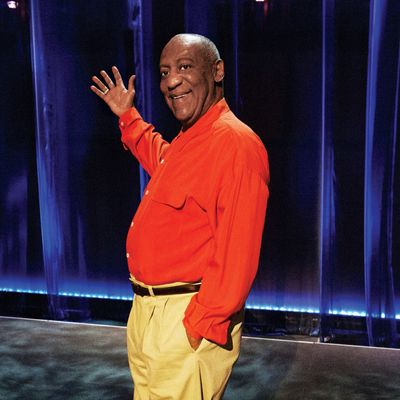
The Comedy Central program Far From Finished is being advertised as Bill CosbyÔÇÖs first full-length stand-up special in three decades, but he only stands up once, not including his entry and exit. This isnÔÇÖt an age thing or a laziness thing; itÔÇÖs a style thing. Cosby has been a sit-down comic for three decades, and this matches his M.O. perfectly. The sight of AmericaÔÇÖs funny-cranky dad in a chair has always sent the not too subliminal signal that youÔÇÖre in for an evening of stories, as opposed to jokes, so you might as well settle in (or settle down). Cosby looks his age here, absolutely, and that means that his brand of humor no longer seems amusingly incongruous. For most of his career, he was an old fogey trapped in a younger manÔÇÖs body, waving a cigar and gabbing about the good old days while mostly avoiding politics, drugs, profanity, and other mainstays of post-sixties stand-up. He still has that beguiling mix of conversational smoothness and vaudevillian overreaction that made him a star in the sixties and led to TV shows (I Spy, Fat Albert and the Cosby Kids, The Cosby Show), feature films (Uptown Saturday Night, LetÔÇÖs Do It Again), and countless ads (he was a pitchman for Ford, Del Monte, Jell-O, and Texas Instruments and earned a place in Madison Avenue infamy by helping to launch New Coke). His much-imitated facial ticsÔÇöthe tilted head, popped eyes, incredulously pursed lipsÔÇöhave never seemed more natural than they do here. TheyÔÇÖre the gestural tools of a blustering grandfather or uncle, somebody whoÔÇÖs here to tell it like it is and is a good enough storyteller that he knows youÔÇÖll keep listening even as you wonder what the point is. But even when Cosby is going big, he goes big in a small way. When overeager fans try to ÔÇ£helpÔÇØ him with his Comedy Central performance, he rolls his eyes heavenward, like Grandpa telling the grandkids that heÔÇÖs not as helpless as they thinkÔÇöthat, in fact, heÔÇÖs still in charge, damn it.
Far From Finished isnÔÇÖt an instant classic on the order of Bill Cosby: Himself or his stand-up albums Revenge, Why Is There Air?, and Wonderfulness. ItÔÇÖs more like a pencil sketch by a master painter or a late film by Woody Allen or Clint Eastwood: Which is to say that itÔÇÖs Old Man Art and that a big part of its pleasure comes from seeing how economically the artist expresses himself and how intuitively he reads and manipulates the room.
CosbyÔÇÖs material has a long white beard. ItÔÇÖs mostly bossy-wife-henpecked-husband material, the sort of thing youÔÇÖd see on a mediocre domestic sitcom or in a quasi-Neanderthal newspaper strip such as ÔÇ£The Lockhorns.ÔÇØ But for a comic who was born in 1937 and always fetishized the Ozzie-and-Harriet model of domestic bliss, Cosby mines this material with subtlety. HeÔÇÖs the unreliable narrator of his own fiction. He gets big laughs portraying himself as a beleaguered, emasculated old man, utterly dominated by his wife, Camille (who, Cosby repeatedly points out, is not his ÔÇ£best friend,ÔÇØ although society requires him to say that she is). But by his own admission, heÔÇÖs a mediocre mate, forgetful and lazy and a poor listener. In CosbyÔÇÖs narrative, marriage is about trading pride for comfort; when he resists his wifeÔÇÖs orders or endures her needling, itÔÇÖs often because he knows sheÔÇÖs right but has just enough male ego to refrain from rolling over too quickly. The special is filled with metaphors of gamesmanship. Fencing is invoked more than once. Ditto chess: ÔÇ£The queen moves anywhere she wants, picking off people,ÔÇØ Cosby says at one point, ÔÇ£and what happens to the king? HeÔÇÖs moving one square!ÔÇØ
CosbyÔÇÖs great innovation was to reject setup-punch-line rhythms and align stand-up with good old-fashioned yarn-spinning. Other comedians got there first (notably Lenny Bruce onstage and Bob Newhart on vinyl), and Cosby had a few near contemporaries who equaled his inventiveness, including Richard Pryor and George Carlin, but there was something quietly daring about his approach, which swapped the ÔÇ£Keep it moving!ÔÇØ ethos for ÔÇ£Relax, weÔÇÖll get there eventually.ÔÇØ
ÔÇ£200 M.P.H.ÔÇØ is the greatest example of this attitude: a 23-minute routine about a new car that takes up a whole side of the 1968 album of the same name. Far From Finished has three comparably protracted examples of slow-burn humor, including a bit in which Cosby gets up in the middle of the night, triggers the security system in his house, has a Newhart-worthy phone conversation with a security-┬¡company agent who wonÔÇÖt deactivate the alarm until Cosby tells her his ÔÇ£code name,ÔÇØ and confidently insists that he doesnÔÇÖt have one. The fact that you can see where the routine is headed doesnÔÇÖt lessen its payoff; like the rest of Far From Finished, it reminds us of the wellspring of CosbyÔÇÖs career: his knack for intimate, laid-back stand-up. And it might make us mourn all the stand-up specials he didnÔÇÖt tape because he was too busy revolutionizing the sitcom, making a mint as a commercial pitchman, stinking up the big screen with Leonard Part 6, lecturing young people on the virtues of pulling their pants up, getting caught in various hypocrisies that belied his self-styled Father of the Century image, and otherwise making us forget about his greatness as a storyteller. We shouldnÔÇÖt. Far From Finished reminds us why.
Far From Finished: Bill Cosby. Comedy Central. November 23 at 8 p.m.
*This article originally appeared in the November 25, 2013 issue of New York Magazine.


